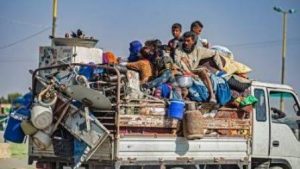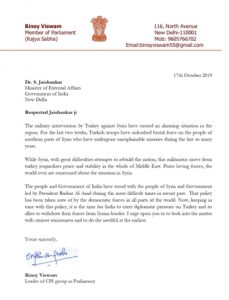One Week On In Syria: What’s Next?
Turkey’s military operations in Syria seem to have more worries as civilians’ causalities and displacement and the escape of more and more detained ISIS fighters from the custody.

It has been a week since Turkish forces led their incursion into northern Syria, catapulting the region into yet another crisis. The US President had ordered the evacuation of a thousand Special Forces troops deployed to contain the ISIS in the region. The US had been largely assisted by the Kurdish-led militia, the Syrian Democratic Forces (SDF). And since last week, it is the SDF that has come under fire, literally from the Turkish armed forces.
Turkey aims to create a buffer zone, along with its border with Syria running at least, thirty km into Syria. The area is dominated by the Kurds, and Turkey fears that the Kurds will unite into a separatist campaign to create their own state—as the Kurds form the largest ethnic and linguistic minority in Turkey.
Also Read : The Growing Conundrum Turkish Military Strikes In Syria
Indian MP Writes Letter to MEA
Member of Parliament (MP), Binoy Viswam, former minister and leader of Communist Party of India, wrote a letter to Dr S. Jaishankar, External Affairs Minister of India (MEA), requesting India to exert diplomatic pressure on Turkey and its allies to withdraw their forces from the Syrian border. He said in the letter that the people and the Government of India have stood with the people of Syria and government led by President Bashar Al Asad during the most difficult times in the recent past.
He also expressed his concerns that Turkish militaristic move will jeopardize peace and stability in the whole region of the Middle East.
Turkey’s Narrative: More Domestic than International?

Many questions are being raised regarding the timings of Turkey’s Operation Peace. While the Turks and the Kurds are traditional foes, there are some interesting notions surrounding the Turkish offensives coming at this particular time, that is, coming at the wake of local elections in which the ruling Justice and Development Party (AKP) suffered major losses. The economic downturn is considered to be a major reason for this, a problem plaguing Turkey which has been compounded more with the influx of refugees from Syria.
The refugee problem has been a major irritant for the Turkish President. Not only have the Syrian refugees proved to be a major financial and social strain, but it has also led to chaos among the domestic electorate of the AKP as well.
The refugees are now the neighbours of the AKP voters, and with the increasing economic downturn, tensions between the locals and refugees have grown manifold, swerving away from the AKP voters. That is where President Erdogan’s plan of a ‘Safe Zone’ is Syria comes in.
What About the US?
The actions of the US president in Syria that of abandoning the Kurds, have come under forward from mostly all quarters. Donald Trump has defended his move by saying repeatedly that the US forces will be withdrawn from the military offensives abroad, which in fact, was part of his election campaign as well. The criticisms and its devastating impact on the Kurdish people have been answered brazenly by the US president, in terms of imposing sanctions on Turkey and ‘destroying the Turkish economy’.
Also Read : Will There Be War Forever In The Heart Of Asia
This is, in fact, a sorry state of international affairs, where hordes of civilians are being killed with the major political players indulging in one-upmanship from the USA to Turkey.
What’s Next?
So after a week into the Turkish offensives, reports of what is being termed as ‘ethnic cleansing’ is emerging from Syria. What this has led to is that the Kurds once a major ally of the US and now left on their own have found solace in Syrian dictator Bashar Al-Assad, the man supported by the two major rivals of the US: Iran and Russia.
Amidst all of these, a major point to ponder is the Turkish plan of a ‘Safe-zone’ in Syria, really ‘Safe’? Many, however, believe it to be otherwise. According to Lama Fakih of Human Rights Watch, the safe zone plan of Turkish increases risk for returned refugees. It is being feared that the Turkish military operations will lead to large-scale displacement of civilians, as well as putting the refugees who will be moved to these areas at huge risk. Not to mention the fact that there are concerns regarding the continued detention of the 12,000 odd ISIS fighters held up by the Kurdish-led autonomous administration.
A region and people already ravaged by violence and displacement are expected to see a further displacement of over 300,000 people.
